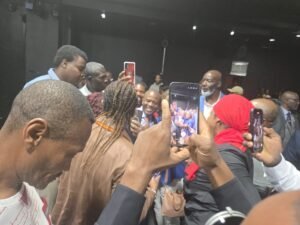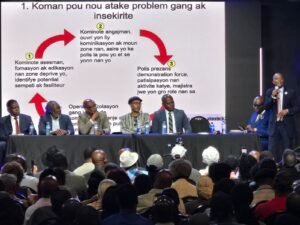The air in the large Montreal convention hall was thick with more than just the murmur of a massive crowd; it was charged with a palpable, decades-old yearning—a collective hunger for a future that has for too long felt like a distant mirage. This past weekend, that yearning found a focal point as more than 5,000 members of Montreal’s vibrant Haitian diaspora gathered not for a carnival or a cultural festival, but for something far more profound: a message of tangible hope and a detailed plan for the renewal of their homeland.
The keynote speaker, Rod Joseph, brought a unique and compelling credibility to the podium. He is not a lifelong politician making promises from a safe distance. He is a Distinguished Purple Heart U.S. Army veteran, a man forged in the fires of conflict and discipline. He is also a current congressional candidate for Florida’s 20th district, a man navigating the complexities of American policy. But on this day, he stood before his people first and foremost as a son of Haiti, articulating a comprehensive and actionable vision to rescue the nation from the brink and guide it toward a future that is fundamentally safe, prosperous, and sovereign.
The event, organized by the renowned Jean Fils-Aimé, Jafrika Ayiti, and CASH, was a powerful display of solidarity within the Haitian community in Canada. This monumental logistical and emotional undertaking, was widely deemed a resounding success. The sheer magnitude of the turnout—a sea of faces representing generations of Haitian-Canadian life—spoke louder than any speech could. It was a silent, powerful referendum on the current state of affairs in Haiti and a deafening demand for change. It reflected a deep, abiding thirst for strong, principled leadership and, most importantly, a tangible, credible path forward.
The Messenger: A Profile in Credibility
Understanding the powerful reception to Rod Joseph’s message requires understanding the messenger. His biography reads like a testament to service and resilience. As a Purple Heart recipient, he has borne the physical and psychological scars of combat, an experience that grants him an intimate, unshakeable understanding of security—not as an abstract concept, but as the absolute prerequisite for life, liberty, and the pursuit of happiness. This military background forms the bedrock of his proposals, infusing them with a realism often absent from political discourse.
Furthermore, his campaign for the U.S. Congress places him at the nexus of international power and policy. He speaks not as an outsider pleading for help, but as a potential insider who understands the levers of American foreign policy and how they can be strategically aligned with Haiti’s best interests. This dual identity—the battle-hardened veteran and the savvy political aspirant—lent his every word a weight that resonated deeply with an audience weary of empty rhetoric and broken promises.
The Core Vision: Security as the Cornerstone
Joseph’s address was not a collection of vague platitudes about “peace” and “prosperity.” It was a structured, detailed blueprint, and its foundation is unshakable security. He correctly identified the current climate of rampant gang violence, political kidnappings, and paralyzing instability as the primary obstacle suffocating all other aspects of Haitian life. Without security, schools cannot function, businesses cannot operate, and citizens cannot live with dignity.

His security proposal is multifaceted, reflecting a military strategist’s eye for detail. Central to it is the concept of a revitalized, professionalized, and deeply vetted Haitian National Police (PNH), supported by international partners not as occupiers, but as trainers, equippers, and advisors. He spoke of intelligence-led operations, community policing models that rebuild trust between citizens and law enforcement, and a ruthless, systemic approach to dismantling the financial and logistical networks that fuel the gangs. This is not about a temporary surge of force; it is about building a permanent, competent, and trusted institution capable of maintaining the state’s monopoly on violence.
Beyond Security: The Pillars of Prosperity and Sovereignty
With the cornerstone of security firmly laid, Joseph built out his vision to encompass the other essential pillars of a functioning nation: economic prosperity and true sovereignty.
His economic plan is directly tailored to harness the most powerful untapped resource Haiti possesses: its diaspora. He articulated a compelling future designed to actively encourage the return home of the millions of Haitians living abroad. This “reverse brain drain” is envisioned not as a sentimental journey, but as a strategic national investment. He outlined incentives for diaspora-led businesses, legal frameworks to protect foreign investment, and a focus on key sectors like agriculture, light manufacturing, and tourism—once the nation is secure.
“Imagine,” he posed to the captivated audience, “a Haiti where you are not afraid to bring your expertise home. A Haiti where your capital is safe, your family is protected, and your entrepreneurial spirit is welcomed as the engine of our rebirth. This is not a dream. This is a plan we can execute together.”

This directly addresses the painful irony of Haiti’s situation: its greatest wealth, the talent and capital of its global children, remains largely externalized because the conditions at home are too perilous. Joseph’s vision seeks to flip this script, transforming the diaspora from a source of remittances into a wave of nation-builders.
Sovereignty, a term often invoked yet rarely realized in Haitian politics, was defined by Joseph as the natural outcome of achieved security and growing prosperity. A nation that can protect its citizens and feed its economy is a nation that can negotiate with the world from a position of strength and mutual respect, not desperation and dependency.
The Diaspora’s Role: From Spectators to Architects
The most powerful element of the event was the explicit call to action directed at the audience. Joseph did not frame the diaspora as passive beneficiaries of a plan that would be executed by others. He framed them as the central architects of this new Haiti.
He called on the doctors, engineers, teachers, entrepreneurs, and tradespeople in the room to begin organizing, not just for another conference, but for a homecoming. He urged them to start thinking about how their skills could be translated into projects on the ground, to form investment groups, to mentor the next generation in Haiti, and to hold any future leadership accountable. The message was clear: the future of Haiti will not be built in the halls of power alone; it will be built by the collective will and effort of its people, both inside and outside its borders.
The enthusiastic response suggested this call did not fall on deaf ears. The question-and-answer session was not marked by skepticism or despair, but by practical inquiries: “How do we ensure transparency?” “What are the first steps in securing Port-au-Prince?” “How can we, from Montreal, start organizing today?” The energy shifted from one of hopeful listening to active engagement.
A Success Measured in Hope
The success of the Montreal gathering cannot be measured solely by its impressive attendance. Its true success is measured in the renewal of a commodity that has been in critically short supply: hope. But this was not the naive hope of wishful thinking; it was the hardened, practical hope that comes from a credible plan delivered by a credible figure.
Rod Joseph offered a narrative starkly different from the one that has dominated for years. He replaced the story of victimhood and despair with one of agency and resilience. He provided a language of solutions where before there was only a litany of problems. For 5,000 people in Montreal, and for the countless others they represent, the path forward for Haiti is no longer a blank space on a map. It is a blueprint, and for the first time in a long time, it appears to have a firm foundation. The task ahead is Herculean, but the message from Montreal is clear: the will to build is there, waiting for the moment it is safe to come home.
Moise Garcon
Transparans senior journalist and Chief Executive
President of VIZAJ Diaspora
The post A New Dawn for Haiti: Diaspora Rallies Behind Veteran’s Blueprint for Renewal appeared first on Transparansmm.

